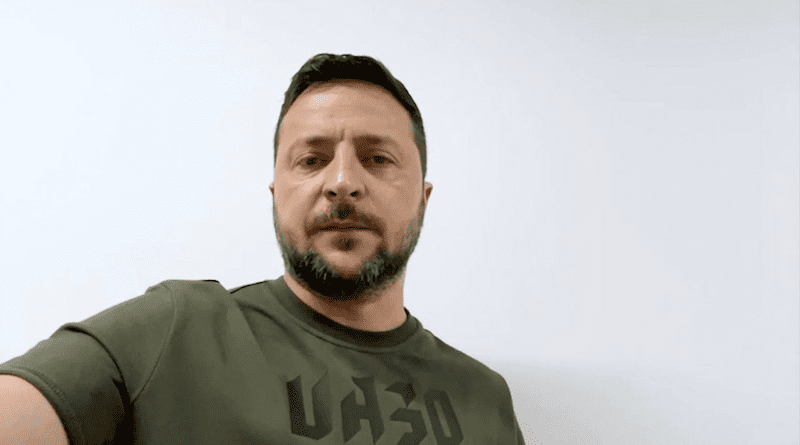Putin Says Zelenskyy’s Term In Office Over, Questions Legitimacy To Negotiate
By RFE RL
(RFE/RL) — President Vladimir Putin said on May 24 that Russia is willing to hold talks about the war in Ukraine, but questioned whether Ukrainian President Volodymyr Zelenskiy has the legitimacy to negotiate on Ukraine’s behalf.
Putin, who spoke in Minsk after meeting with authoritarian Belarusian leader Alyaksandr Lukashenka, said that Zelenskiy’s five-year term in office was supposed to end on May 20.
“Of course, we are aware that the legitimacy of the current head of state has ended,” Putin said at a joint news conference with Lukashenka. “We must be completely sure that we are dealing with legitimate authorities.”
Zelenskiy was inauguraged for a five-year term on May 20, 2019. An election was to have taken place on March 31 of this year but was postponed because the country is still under martial law.
Under the Ukrainian Constitution, Zelenskiy must continue to perform his duties until a new head of state is elected.
Ukraine has been under martial law since Russia launched its full-scale invasion in February 2022 and would have to amend the law in order to hold elections during a state of war.
When the question of Zelenskiy’s legitimacy was raised earlier this week, an EU spokesman said that the European Union had no doubt about Zelenskiy’s status as leader of Ukraine, and the spokesman for UN Secretary-General António Guterres said Zelenskiy “remains…the person with whom the secretary-general communicates when he needs to contact the Ukrainian leader.”
In his comments at the joint news conference, Putin, who was reelected to a fifth term in March in an election that the United States and other Western countries did not consider free and fair, failed to acknowledge the limitations on Ukraine holding an election while the country is regularly under Russian attack.
Putin reiterated that Russia “is for negotiations on Ukraine,” but said it would be possible to return to talks “only based on today’s realities in the special operations zone.”
Zelenskiy has rejected Moscow’s preconditions, including allowing Russia to retain the territory its forces have taken thus far in the war.
An international peace conference on Ukraine is to be held in Switzerland in June to discuss Zelenskiy’s peace plan, but Russia has not been not invited. Putin has dismissed the conference’s importance.
A U.S. diplomat, asked on May 24 about potential routes for peace in Ukraine, said Ukraine’s allies don’t view Putin as interested in peace right now.
“He has chosen a path of war, and it’s important that Ukraine have the opportunity to stabilize on the battlefield,” U.S. Assistant Secretary of State James O’Brien said in a call with reporters.
“We are always interested in seeing that when Ukraine is prepared to make peace that it’s able to do so on terms that are a success for Ukraine.”
Russia and Belarus, meanwhile, have increased their ties and continue to foresee eventually forming a so-called union state.
Lukashenka and Putin held one-on-one talks before the news conference for about 45 minutes.
Putin said that he and Lukashenka discussed “issues of formation of a unified defense space,” noting that a “joint regional grouping of troops, Russian defense complexes, and tactical nuclear weapons are deployed on Belarusian territory.”
He said Russia regularly conducted exercises of nuclear forces and “now they are conducted with Belarusian allies.”
Lukashenka has given Moscow permission to deploy Russian tactical nuclear weapons and troops to in Belarus, which shares a border more than 1,000 kilometera long with Ukraine.
Lukashenka said there was nothing special about the joint training, which he said was necessary because the because the world is “unstable” and “dangerous.”
“Despite everything, Minsk and Moscow maintain the course of strengthening integration. We support each other and will support each other in all directions,” he said.
Putin arrived in Minsk on a two-day visit on the evening of May 23. It is his second foreign visit since his inauguration on May 7. His first visit to a foreign country after his inauguration was to China.

